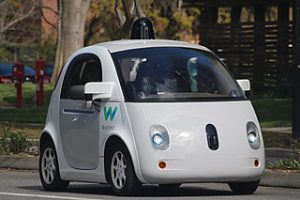The huge increase in interest towards autonomous vehicles has caused concern for numerous vehicle manufacturers across the globe. Many now see technology firms as being better placed than carmakers to develop and profit from the software that will underpin automated driving (The Economist, 2016). Tesla is a key example, given that it did not originally set out to be a vehicle manufacturer but is now the most valuable car company in the US. But is this really a cause for concern for core vehicle manufacturers?
Driverless and automated cars are not traditionally known to be made by conventional vehicle makers, but by tech-savvy firms like Tesla in Silicon Valley. Other non-vehicle manufacturers such as Apple and Dyson are also rumoured to be working on automated vehicles. Yet, with recent news telling of Jaguar Land Rover’s move to hire 5,000 more people to enhance its expertise in autonomous and electric technology, 1,000 of which will be electronic and software engineers, there are clear signs of change in the industry. The jobs, which will be mostly in the UK, are demonstrative not only of the growing interest in driverless technology but also of well-known carmakers recognising that they need to be involved in the technological tidal wave. Jaguar Land Rover clearly understand the disruption that driverless and automated vehicles are causing to the motor industry and have decided to be ahead of the curve by manufacturing their own automated vehicles. Indeed, they have indicated that half of all new models will be available in an electric version by the end of the decade, necessitating new skills among its staff (BBC News).
It is not only Jaguar Land Rover who have recognised the need to reinvent themselves, however. Ford has been rumoured to be teaming up with Amazon to connect its cars to sensor-laden smart homes, BMW is aiming to produce driverless technology within 5 years following its alliance with Intel, and Toyota is starting to use Ford’s in-car technology to access smartphone apps and other features (The Economist, 2016). Whilst it is somewhat true that private, more technological savvy companies tend to attract more funding, conventional car manufacturers, like Ford, BMW and Toyota, continue to invest in auto tech. Audi has also joined the bandwagon, revealing several autonomous vehicle prototypes derived from their A7 and RS7 models, as well as Volvo who plans to give 100 Swedish customers early access to an autonomous XC90 SUV this year (CBInsights, 2017). Honda, Hyundai, Nissan and Renault are also expanding in this area, with the latter promising that 10 autonomously functioning vehicles with will be on sale by 2020. The question of whether conventional manufacturers have the resources to compete is therefore exaggerated.
Almost all conventional car manufacturers are now investing in this technology which clearly shows the direction that the automotive industry is moving in. In fact, some reports even say that Europeans will only buy autonomous, electrical powered cars by 2035 and that their sales will surpass conventional, gas powered vehicles by 2038. Further reports estimate that driverless vehicles could reach 10m worldwide by 2030. With estimates aside, governments are also becoming involved, for example the UK recently committed £100m to test projects (Bradley, BBC News, 2017). It is therefore very clear that conventional vehicle manufacturers remain competitive in light of the technological tidal wave.
References:
CBInsights Research Briefs (18 May 2017) “44 Corporations Working On Autonomous Vehicles”
Jennifer Bradley (31 July 2017) “Will you need a driving licence in the age of self-driving cars?” BBC News
The Economist (9 January 2016) “The driverless, car-sharing road ahead”
The Economist (22 September 2016) “Who’s self-driving your car?”
» Next post: Artificial Intelligence: An Easy Pill to Swallow
